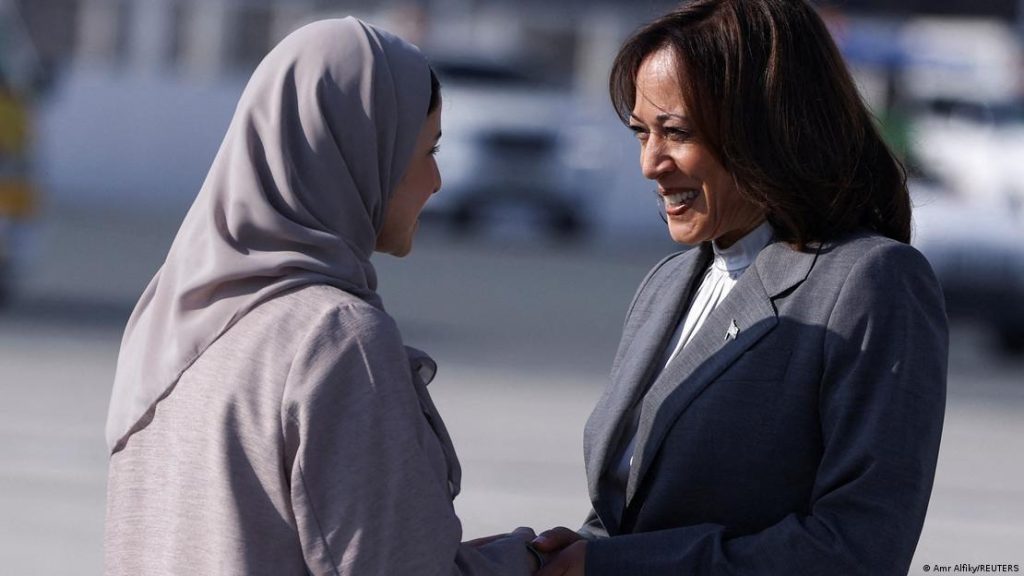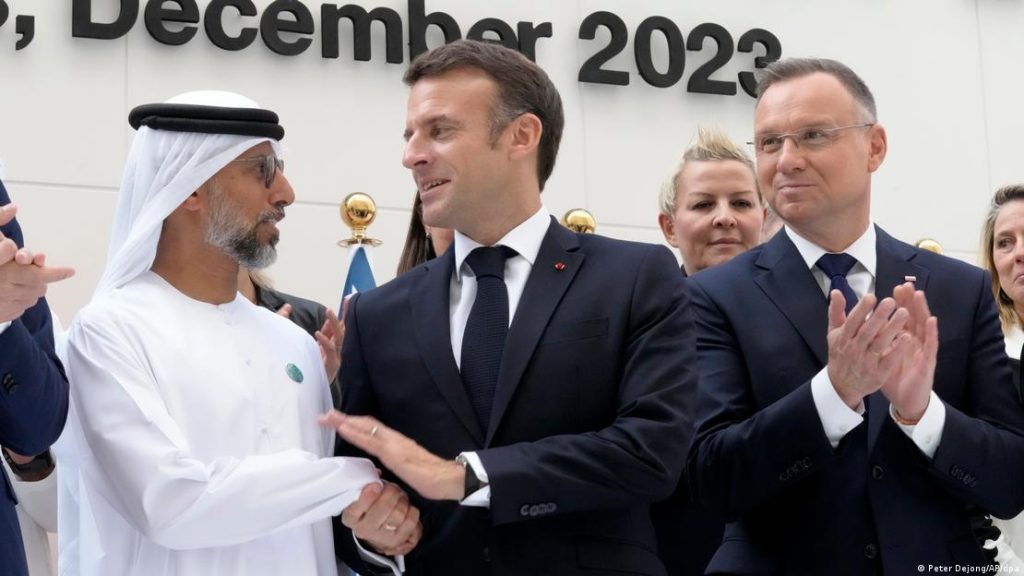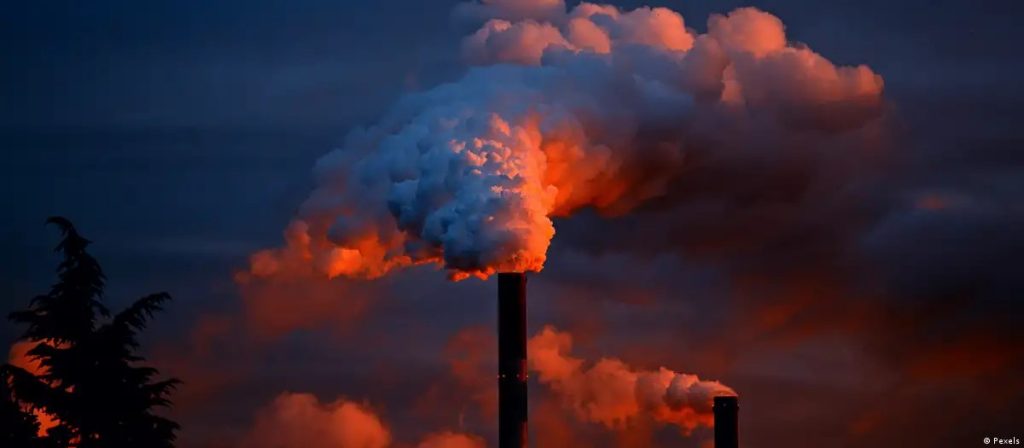
Over 100 years of man-made CO2 emissions have changed the planet – World leaders are meeting for the 28th time to address the causes and effects of climate change – Image: Pexels
German Chancellor Olaf Scholz has called for coal, oil and gas to be phased out at the COP28 summit in Dubai on Saturday. “We must now all show a firm determination to phase out fossil fuels — first and foremost coal. We can set sail for this at this climate conference,” Scholz told delegations from around the world.
Scholz said Germany is leading the development of a number of clean energy solutions and reiterated Germany’s pledge to be climate-neutral by 2045.
“The technologies are there: wind power, photovoltaics, electric motors, green hydrogen,” he added.
More than 100 countries at the summit have also called for a “phase-out” of fossil fuels rather than a “phase-down,” with US Vice President Kamala Harris joining the calls on Saturday.
Environmentalist groups welcomed the goals set out by Scholz but said his government had not demonstrated enough action on the issue.
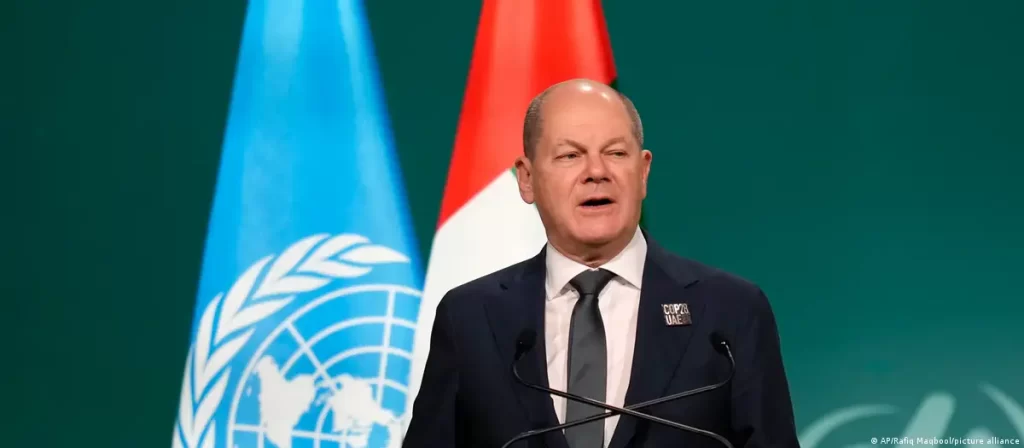
Olaf Scholz touted the “Climate Club,” which Germany co-chairs alongside Chile – Image: AP/Rafiq Maqbool/picture alliance
“While the German government is sending positive signals in Dubai, in Germany, court rulings are first needed to force the government to act,” said Viviane Raddatz, head of climate policy for the WWF in Germany.
Greenpeace Germany’s executive director Martin Kaiser said Scholz lacked “consistency and credibility” in his climate policy.
More than 100 nations pledge to triple renewables
Scholz also reiterated calls to triple renewable energy expansion to triple by 2030.
“It is still possible for us to reduce emissions enough in this decade to meet the 1.5 degree target,” he said.
“Let’s agree here in Dubai on two binding targets: one is to triple the expansion of renewable energy and the other is to double energy efficiency — both by 2030.”
At least 118 nations have agreed to the target including Brazil, Nigeria, Australia, Japan, Canada, Chile. China and India have indicated support but have so far not officially backed the pledge.
Germany launches climate club on industrial policy
He also touted the ambitions of the “Climate Club,” a group of 36 nations co-chaired by Germany and Chile that aims to make high-polluting industries more sustainable in developing countries, but called on countries like China and the Gulf states to take on more responsibility in this area.
“For the countries whose prosperity has grown enormously over the last decades and which have contributed to a large extent to today’s global emissions also bear responsibility: We need your support too,” he said.
Leaders discuss international climate financing
At COP28, the US vice president also made a new $3 billion (€2.8 billion) pledge to the Green Climate Fund that helps developing countries with climate adaptation and mitigation.
“This is a pivotal moment. Our action, or worse, our inaction today … will impact the lives of billions of people for decades to come,” Harris said.
However, she acknowledged that “there is more work to do.”
Barbados Prime Minister Mia Mottley said earlier that major countries and financial institutions should do more to fund international climate adaptation.
“Loss and damage alone, however, is only a part of the equation,” she said. “Because for every dollar that we spend before disaster, we can save $7 in damage, and indeed loss of lives.”
Some delegates were skeptical about international climate financing as it stands.
Timor-Leste’s President Jose Ramos Horta slammed what he called “shark loans” that burden developing countries with debts they cannot easily recover from.
Pope Francis, unable to attend the summit due to ill health, meanwhile said he hoped COP28 would be a “turning point” in a speech read out by Vatican Secretary of State Cardinal Pietro Parolin in Dubai.
“Sadly, I am unable to be present with you, as I had greatly desired. Even so, I am with you, because time is short,” the pope said in his message.
COP28: What leaders say about the future of the planet
As this year’s UN climate conference gets underway in earnest, heads of state and government are addressing the world. Their speeches give an insight into what is at stake during the upcoming two weeks of negotiations.
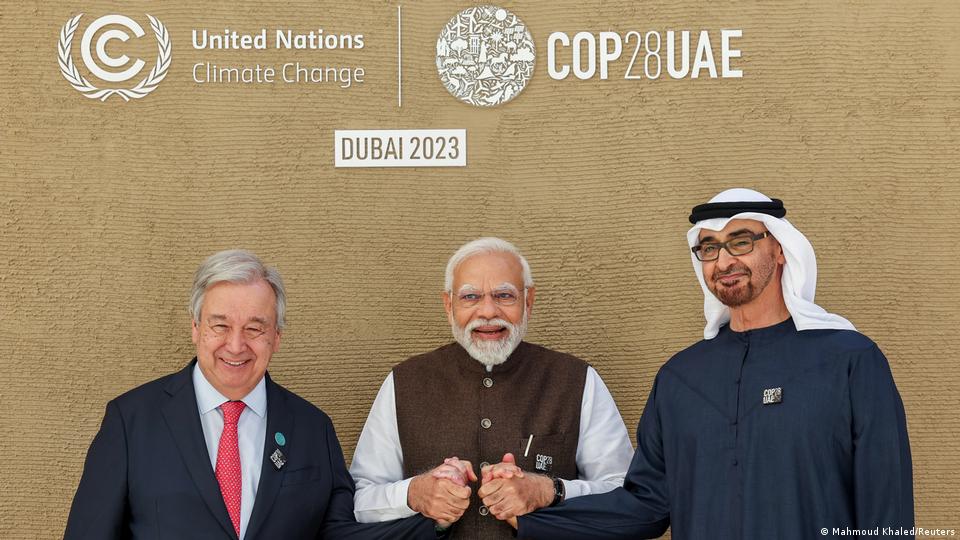
Antonio Guterres (left) made a renewed call for leaders to take urgent action – Image: Mahmoud Khaled/Reuters
Speakers at COP28 on Friday included Crown Prince Mohammed Bin Salman of Saudi Arabia, a leading oil producer, and Narendra Modi, prime minister of India, where sprawling cities suffer from worsening air pollution. UN Secretary-General Antonio Guterres was among the first to address delegates.
Reiterating his message that unprecedented global heating is causing human suffering, he called on leaders to take urgent action.
“We cannot save a burning planet with a fire hose of fossil fuels … The 1.5 degree limit is only possible if we ultimately stop burning all fossil fuels,” Guterres said.
The phase-out of coal, oil and gas will be a defining issue at this year’s conference. Though the burning of fossil fuels is the prime cause of climate change, the 27 previous climate conferences have failed to deliver a commitment to phase them out in the long term.
Guterres, who has long been a critic of oil, gas and coal, urged leaders to “help” industries commit to sustainable production. This can be achieved “by regulating, legislating, putting a fair price on carbon, ending fossil fuel subsidies, and adopting a windfall tax on profits,” he said. He also called on fossil fuel companies to transition to renewable energy sources.
In parallel with the opening addresses, German Chancellor Olaf Scholz was on hand at a roundtable talk in Dubai to officially launch the 36-member country Climate Club, which aims to “scale-up the lead markets for climate-neutral industrial products, such as climate-friendly steel, cement or aluminium,” said Scholz.
The German leader added that the club aims to set a standardized approach to calculating emissions instensities for hard-to-abate industries like cement and steel production. He added that once this work is done, they have the “greenprints” to decarbonize those sectors.
The members are “united by the shared conviction that climate change is the greatest challenge of the 21st century,” said Scholz.
Royal call for transformation
King Charles III of the United Kingdom said “I pray with all my heart that COP28 will be another critical turning point towards transformational action at a time when, already, as scientists have been warning for so long, we are seeing alarming tipping points being reached.”
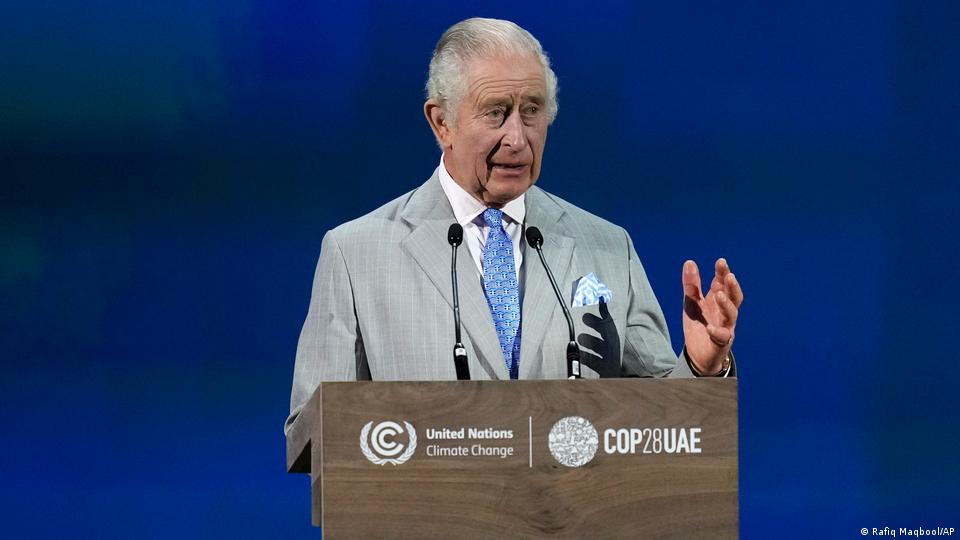
King Charles III has long been vocal about the need to protect the natural world – Image: Rafiq Maqbool/AP
His remarks came a day after the UN said 2023 was on track to become the hottest year recorded in human history.
“Unless we rapidly repair and restore nature’s economy, based on harmony and balance, which is our ultimate sustainer, our own economy and survivability will be imperiled,” said the British monarch.
Calls for climate justice from Brazil
President Luiz Inacio Lula da Silva of Brazil, home to most of the world’s biggest natural carbon-capture zone on land, the Amazon rainforest, said “the planet is tired of climate agreements that were not fulfilled.” He added that he has had enough of “eloquent and empty speeches.”
“In the north of Brazil, the Amazon region is suffering one of the most tragic droughts of its history. In the South, we are facing tempests and hurricanes that lead to a lot of destruction and death,” he said.
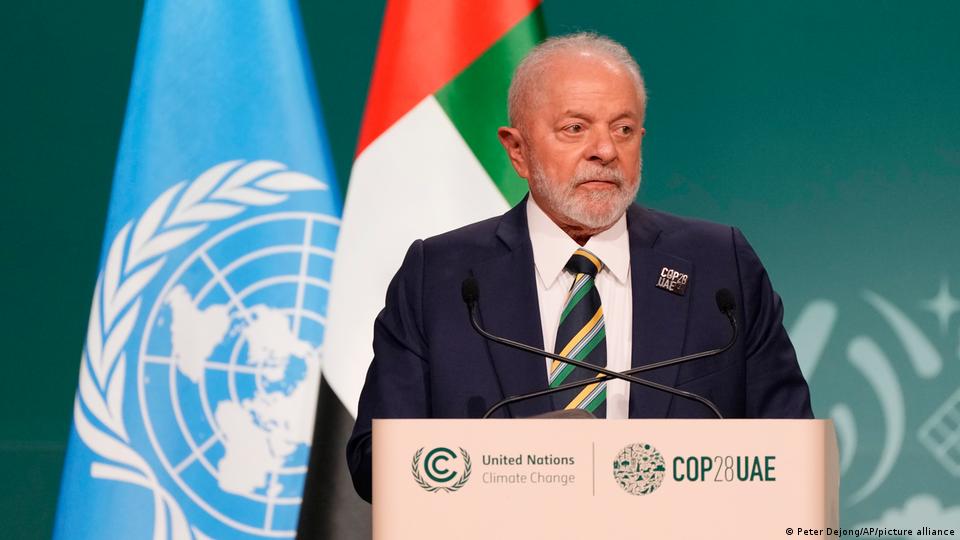
The Brazil president described climate impacts in the Amazon – Image: Peter Dejong/AP/picture alliance
Lula called for climate justice for poorer nations that didn’t cause the problem and said the $2 trillion spent on weapons last year could instead be spent on fighting hunger and climate change. He said Brazil will stop Amazon deforestation by 2030.
Indian leader invokes ‘unity’ and offers to host COP33
Indian Prime Minister Narendra Modi said every nation must “work in unity” to achieve their climate targets, while also asking developing countries to consume “a fair share” of the global carbon budget.
“Today the entire world is watching us. Mother Earth is looking towards us to protect her future. We have to succeed,” he said.
The leader of the world’s most populous country that also hosted a G20 summit this year, offered to host UN climate summit.
“From this platform today, I propose that India will host COP33 in 2028,” he said.
‘This COP can make history,’ says EU head
“In Dubai we have to deliver,” saidUrsula von der Leyen, the president of the European Commission, adding that emissions “must peak by 2025” and that “we must phase out fossil fuels.”
But she also spoke to the importance of loss and damage at this year’s COP.
“We will take a decisive step forward to protect the most vulnerable citizens wordwide,” she said of those most impacted by climate extremes who suffer increasing “loss and damage.”
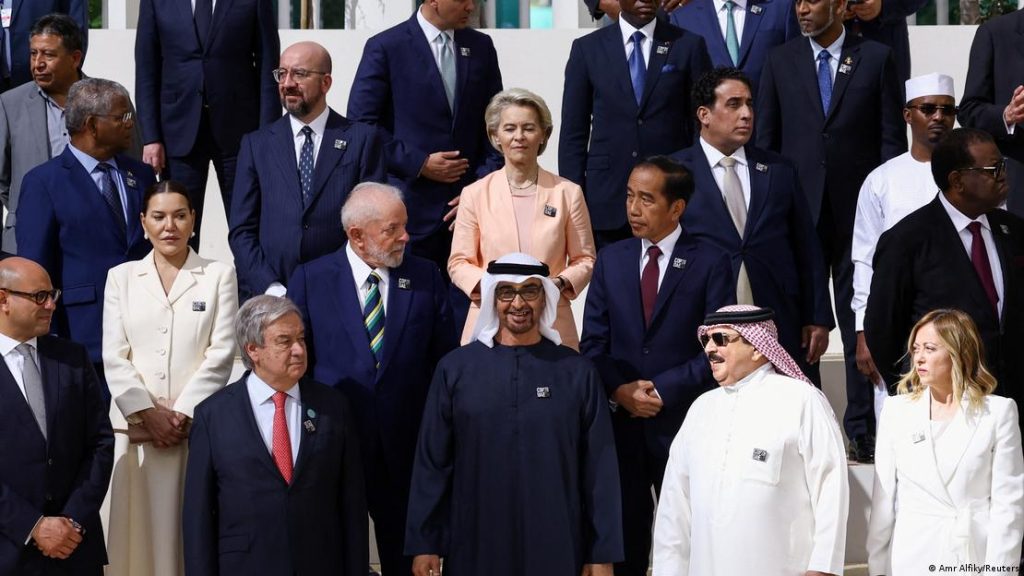
Ursula van der Leyen (centre) wants delegates to agree to triple renewable energy by 2030 – Image: Amr Alfiky/Reuters
“Will will stand by their side,” she added, and committed €270 million from the EU to the loss and damage fund that was launched at COP28.
Von der Leyen said some progress had been made on emissions, with the EU having already peaked and on track to “overshoot” its greenhouse gas reduction targets and having adopted a law to “drastically reduce” methane emissions.
She said a call by the EU to triple the production of renewable energy and double energy efficiency by 2030 should be adopted in the final COP28 decision.
“This COP can make history,” she insisted, saying the “the future of energy will be green, will be affordable, and it will be homegrown.”
Macron: Both developed and emerging economies must decarbonize
“The top priority is that developed countries must phase out fossil fuels,” said French President Emmanuel Macron, adding that his country has a “plan” and a “strategy” to achieve the goal though clean energy including “nuclear, hydrogen and renewables.”
Continued investment in coal — the most carbon-intensive fossil fuel — was “truly an absurdity,” he said while urging G7 nations to set an example and “commit to putting an end to coal” by 2030.
He said emerging countries also need “to phase out carbon,” and any efforts to improve economic performance cannot rely on fossil fuels. (DW/NN-03-12-23)



